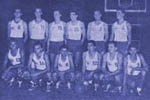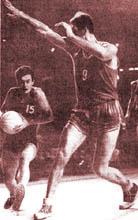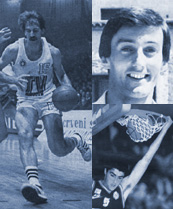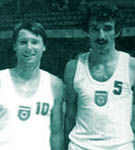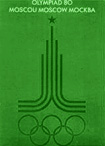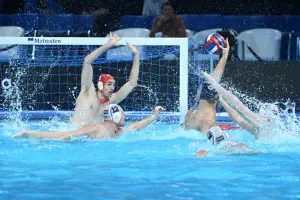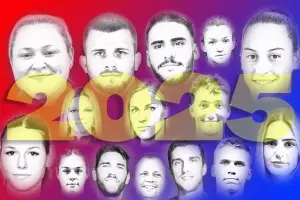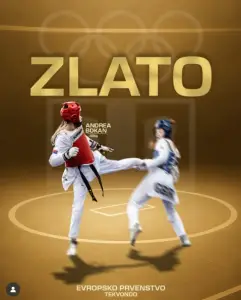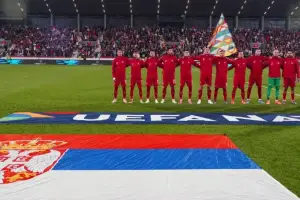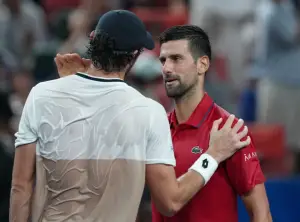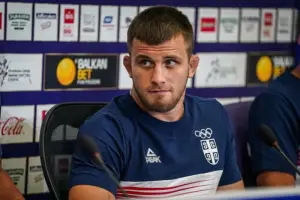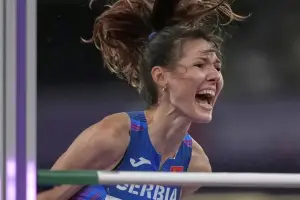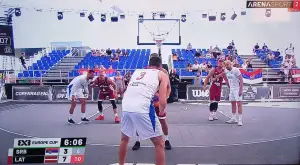Q:
A:
Go for Basket!
4 March 2004
From the history of Yugoslavia's basketball
First basketball ball in Serbia
The first basketball ball was brought to Serbia from the US in 1924 by William Willand, a representative of the Salvation Army. Willand came to Belgrade to introduce the official rules of basketball to the Belgrade teachers and professors. Serving as an interpreter, Dragica Popovic from the Belgrade Red Cross, escorted the guest.
The hosts were highly interested in this visit. A lot of curious people who wanted to get acquainted with this game, completely unfamiliar to them, attended Mr. Willand's seminars.
As a gesture of appreciation and high esteem, Mr. Willand gave Mrs. Popovic, who escorted him during his short visit to Serbia, a basketball ball. According to all historical evidence, this was the first basketball ball in Serbia.
The hosts were highly interested in this visit. A lot of curious people who wanted to get acquainted with this game, completely unfamiliar to them, attended Mr. Willand's seminars.
As a gesture of appreciation and high esteem, Mr. Willand gave Mrs. Popovic, who escorted him during his short visit to Serbia, a basketball ball. According to all historical evidence, this was the first basketball ball in Serbia.
Last place on first World Championship
The basketball team of Yugoslavia arrived in 1950 to Buenos Aires to the First World Basketball Championship instead of Italy, which cancelled its participation. Without long and serious preparations, without coach and with a team gathered in a short time, Yugoslavia was already condemned to be the last. In the first match, the "blue" team was defeated by Peru, and Nebojsa Popovic, the captain and the coach of the team, scored the first, historical shot for Yugoslavia.
After defeat from Chile, once again from Peru, Ecuador, Spain, the Yugoslav team won the last, 12th place.
Only 20 years later, on the World Championship in Ljubljana, the Yugoslav basketball players superiorly won the golden medal. The Yugoslavs, who learned basketball in Argentina, gave a lesson of modern and attractive basketball to their former teachers. That's why the participation in the first World Championship was huge experience, but first of all, it was stimulus for development of basketball in Yugoslavia.
After defeat from Chile, once again from Peru, Ecuador, Spain, the Yugoslav team won the last, 12th place.
Only 20 years later, on the World Championship in Ljubljana, the Yugoslav basketball players superiorly won the golden medal. The Yugoslavs, who learned basketball in Argentina, gave a lesson of modern and attractive basketball to their former teachers. That's why the participation in the first World Championship was huge experience, but first of all, it was stimulus for development of basketball in Yugoslavia.
First medal
The first medal on a significant competition Yugoslavia won in the European championship in Belgrade in 1961.
It was a generation of Yugoslav players trained by Aleksandar Nikolic and led on the field by Radivoj Korac, one of the top European scorer of all times.
Although the placing into the European championship finals itself was a major success, Yugoslav team hoped that it would, with the support of its fans, make the final step and defeat, at the time invincible, the USSR team in the match for golden medal.
Encouraged by the support of more than 12,000 spectators in the Belgrade Fair Hall, Yugoslav players started the game with success and led by 15-6. However, as the time passed, the power, experience and distinct advantage in height of the Soviet players became fully expressed, and the crucial role was played by their center player Jan Kruminsh, 218 cm tall and 140 kg of weight.
Finally, the Soviet team won by 75:58 and preserved the first place in the European basketball. It was the first Yugoslav medal in a series of successes that occurred in the following years and decades.
It was a generation of Yugoslav players trained by Aleksandar Nikolic and led on the field by Radivoj Korac, one of the top European scorer of all times.
Although the placing into the European championship finals itself was a major success, Yugoslav team hoped that it would, with the support of its fans, make the final step and defeat, at the time invincible, the USSR team in the match for golden medal.
Encouraged by the support of more than 12,000 spectators in the Belgrade Fair Hall, Yugoslav players started the game with success and led by 15-6. However, as the time passed, the power, experience and distinct advantage in height of the Soviet players became fully expressed, and the crucial role was played by their center player Jan Kruminsh, 218 cm tall and 140 kg of weight.
Finally, the Soviet team won by 75:58 and preserved the first place in the European basketball. It was the first Yugoslav medal in a series of successes that occurred in the following years and decades.
Cvetkovic's historical free-throws
The Yugoslav basketball national team won the first Olympic medal in Mexico in 1968. The Yugoslavs played well and placed themselves into the semifinals where they played versus Soviet Union. In clash between basketball David and Goliath, in front of 22.000 supporters who gave their sympathies to David, i.e. Yugoslav team, the key man of the match was player of Red Star, Vladimir Cvetkovic.
Seven seconds before the end of the match, at the result 61-60 for Yugoslavia, Cvetkovic scored two free throws for 63-61. The Soviets had enough time to reduce to 62-62, but not enough time to avoid defeat. The celebration of the host for victory of Yugoslav team quickly hauled from the hall to the streets of Suidad Mexico, and lasted till daybreak.
The team of the USA was too strong rival in the finals and the Yugoslav team was defeated with 50-65 scoring the second place in the basketball tournament.
Seven seconds before the end of the match, at the result 61-60 for Yugoslavia, Cvetkovic scored two free throws for 63-61. The Soviets had enough time to reduce to 62-62, but not enough time to avoid defeat. The celebration of the host for victory of Yugoslav team quickly hauled from the hall to the streets of Suidad Mexico, and lasted till daybreak.
The team of the USA was too strong rival in the finals and the Yugoslav team was defeated with 50-65 scoring the second place in the basketball tournament.
Records of Dalipagic, Varajic and Danilovic
The best scorer of the Yugoslav basketball ever is Drazen Dalipagic. Playing for the Belgrade Partizan team, he was twice the best scorer of the league - in 1977 (34,6 points per match) and in 1982 (42,9).
While playing for the Yugoslav national team, he took part in 243 games and recorded 3,131 points. With a total of 562 points he is firmly positioned first on the list of best scorers of the Yugoslav national team in the World Championships, ahead of Dragan Kicanovic. In the 8th World Championship in Manila in 1978, when Yugoslavia won a golden medal for the second time, Dalipagic was the best scorer (200 points) and the best player.
While playing in Italy, he was the best scorer of the league five times, and according to the scored points per game average, he is the best scorer of Italian Championships ever.
The record in the number of points scored in the final matches of the European Champions' Cup (now the Euroleague) is held by a Yugoslav, Zarko Varajic, who, playing for the Sarajevo Bosna against the Italian Emerson in 1979 recorded as much as 47 points.
Predrag Danilovic is a Yugoslav basketball player with the greatest number of golden medals won in the European Championships. When he was 19 years old, he was the youngest member of the Yugoslav national team, which, in 1989, in Zagreb, won the first place. Two years later, in Rome, the same happened - by defeating Italy in the finals, Yugoslavia successfully finishes yet another quest towards the European basketball top, and Danilovic added another golden medal to his collection.
In the first bigger contest after the lifting of sanctions, in Athens in 1995, the Yugoslav basketball players only picked up where they left off, forcibly, four years ago in Rome, defeating, in a thrilling final match, the national team of Lithuania. The key roles of yet another triumph in the European Championships, were, aside from Djordjevic, played by Divac, Bodiroga, Savic and - Danilovic.
In Spain in 1997, the Yugoslav basketball players were, for the fourth time in a row, the best in Europe, and Danilovic enters the history of the Yugoslav basketball as the first and, for now, the only basketball player who won four golden medals in the European Championships.
While playing for the Yugoslav national team, he took part in 243 games and recorded 3,131 points. With a total of 562 points he is firmly positioned first on the list of best scorers of the Yugoslav national team in the World Championships, ahead of Dragan Kicanovic. In the 8th World Championship in Manila in 1978, when Yugoslavia won a golden medal for the second time, Dalipagic was the best scorer (200 points) and the best player.
While playing in Italy, he was the best scorer of the league five times, and according to the scored points per game average, he is the best scorer of Italian Championships ever.
The record in the number of points scored in the final matches of the European Champions' Cup (now the Euroleague) is held by a Yugoslav, Zarko Varajic, who, playing for the Sarajevo Bosna against the Italian Emerson in 1979 recorded as much as 47 points.
Predrag Danilovic is a Yugoslav basketball player with the greatest number of golden medals won in the European Championships. When he was 19 years old, he was the youngest member of the Yugoslav national team, which, in 1989, in Zagreb, won the first place. Two years later, in Rome, the same happened - by defeating Italy in the finals, Yugoslavia successfully finishes yet another quest towards the European basketball top, and Danilovic added another golden medal to his collection.
In the first bigger contest after the lifting of sanctions, in Athens in 1995, the Yugoslav basketball players only picked up where they left off, forcibly, four years ago in Rome, defeating, in a thrilling final match, the national team of Lithuania. The key roles of yet another triumph in the European Championships, were, aside from Djordjevic, played by Divac, Bodiroga, Savic and - Danilovic.
In Spain in 1997, the Yugoslav basketball players were, for the fourth time in a row, the best in Europe, and Danilovic enters the history of the Yugoslav basketball as the first and, for now, the only basketball player who won four golden medals in the European Championships.
Scandal in Munich
The Olympic Games in Munich 1972 will stay in bad memory of sport fans, first of all because of terrorist attack on Israeli team in Olympic village, but also because of the scandals, which followed the basketball tournament.
The Yugoslav national team arrived to Munich as official world champions from Ljubljana 1970 still hoping to win one of the medals though the team was quite changed. The victory over Italy 85-78 at the beginning of the tournament approved the expectations, but in the second round, the Yugoslav team was defeated by Puerto Rico. Few days later, the official medical report confirmed that some players of Puerto Rico team were drugged during the match against Yugoslavia but it was decided that the game should be registered under the achieved result.
The scandalous decision that gave credit to the victory of Puerto Ricans caused anger among the players and the leadership of the Yugoslav national team. Some demanded to leave the competition in protest, the others wished to play and try winning the medal. At the end, only 23-year old Ljubodrag Simonovic refused to play and returned home sooner.
Under the impression of an unjust decision and disturbed with the conflicts from the inside, the Yugoslav team still continued with the competition and won only the fifth place winning seven games.
The Yugoslav national team arrived to Munich as official world champions from Ljubljana 1970 still hoping to win one of the medals though the team was quite changed. The victory over Italy 85-78 at the beginning of the tournament approved the expectations, but in the second round, the Yugoslav team was defeated by Puerto Rico. Few days later, the official medical report confirmed that some players of Puerto Rico team were drugged during the match against Yugoslavia but it was decided that the game should be registered under the achieved result.
The scandalous decision that gave credit to the victory of Puerto Ricans caused anger among the players and the leadership of the Yugoslav national team. Some demanded to leave the competition in protest, the others wished to play and try winning the medal. At the end, only 23-year old Ljubodrag Simonovic refused to play and returned home sooner.
Under the impression of an unjust decision and disturbed with the conflicts from the inside, the Yugoslav team still continued with the competition and won only the fifth place winning seven games.
Infallible scorer Radivoj Korac
Even today he is considered to be one of the best players in the history of the European basketball. Radivoj Korac, known as "Zucko" was the best and most efficient player of the Yugoslav team in the sixties. He won with the Yugoslav team six medals - five silver medals and one bronze.
He is remembered as an unsurpassable scorer. Playing for OKK Belgrade, versus Alvik Stockholm, in a match of European Champions' Cup in 1964 (OKK Belgrade won 155-57), "Zucko" scored incredible 99 points!
Korac was three times in a best European selection, and even seven times he won the title of the best Yugoslav shooter. He will stay remembered also by his specific free-throws (see the picture).
In June 1969, a life and basketball carrier of 31 years old Korac was stopped in a car crash. Shortly after this tragedy, a competition "Cup of Radivoj Korac" was established as a remembrance on this player who became a legend too early.
He is remembered as an unsurpassable scorer. Playing for OKK Belgrade, versus Alvik Stockholm, in a match of European Champions' Cup in 1964 (OKK Belgrade won 155-57), "Zucko" scored incredible 99 points!
Korac was three times in a best European selection, and even seven times he won the title of the best Yugoslav shooter. He will stay remembered also by his specific free-throws (see the picture).
In June 1969, a life and basketball carrier of 31 years old Korac was stopped in a car crash. Shortly after this tragedy, a competition "Cup of Radivoj Korac" was established as a remembrance on this player who became a legend too early.
Slavnic's glorious performance against Italians
The Americans have, for four years, eagerly awaited the return game with the USSR at the basketball tournament in Montreal, after the defeat in the controversial final match at the Olympics in Munich in 1972.
However, the return game never took place, thanks to the Yugoslav national team, which, in the semi-finals, after an uncertain and difficult struggle - even though they led by 19-4 in the first half - defeated the Soviet national team by 89-84.
Nevertheless, the crucial match at the Olympics, the Yugoslav team played earlier on in the B group against Italy. After the first half, the semi-finals were almost unreachable for the Yugoslavs, since the Italians were leading by 15 points.
In the second half, they switched roles - the Yugoslavs started to play fantastically and gradually decreased the lead of the confused opponents. Zoran "Moka" Slavnic took over the leading position and in this best game of his career he practically single-handedly defeated the self-confident Italians. Slavnic made flawless passes and hits, and with the scores in the last seconds of this match, he ensured the victory to his team - 88-87.
Yugoslavia won a silver medal, since it was defeated in the finals by the US - 74-95.
However, the return game never took place, thanks to the Yugoslav national team, which, in the semi-finals, after an uncertain and difficult struggle - even though they led by 19-4 in the first half - defeated the Soviet national team by 89-84.
Nevertheless, the crucial match at the Olympics, the Yugoslav team played earlier on in the B group against Italy. After the first half, the semi-finals were almost unreachable for the Yugoslavs, since the Italians were leading by 15 points.
In the second half, they switched roles - the Yugoslavs started to play fantastically and gradually decreased the lead of the confused opponents. Zoran "Moka" Slavnic took over the leading position and in this best game of his career he practically single-handedly defeated the self-confident Italians. Slavnic made flawless passes and hits, and with the scores in the last seconds of this match, he ensured the victory to his team - 88-87.
Yugoslavia won a silver medal, since it was defeated in the finals by the US - 74-95.
Professor of basketball
"Everybody knows what is good basketball, but he is one of the few who know how it is being made", said one of the most successful coaches Bozidar Maljkovic about his teacher, professor Aleksandar Nikolic.
Numerous successes of the Yugoslav basketball are connected to Nikolic. With him as a coach, the Yugoslav national team won its first medal on European championships - the silver medal in Belgrade in 1961, as well as its first medal on world championships - also the silver one in Rio de Janeiro in 1963. After the practice in Italy, Nikolic returned at the helm of the national team, winning two gold medals - on the 1977 European championship in Liege and 1978 World championship in Manila.
Nikolic was successful wherever he used to go. At the beginning of the '90s, he was the expert adviser of the Belgrade Partizan coach Zeljko Obradovic, greatly contributing with his knowledge to the most successful season in the history of this club. In this season Partizan won the Championship, the Cup and the European Champions' Cup.
Numerous generations not only of talented Yugoslav players but coaches matured under Nikolic's watchful eye. Bozidar Maljkovic is the first coach who won the European Champions' Cup (now Euroleague) with three different teams, while Zeljko Obradovic is doubtlessly the most successful European coach of today, since he won numerous medals and trophies with the Yugoslav clubs and national team in the past decade.
Numerous successes of the Yugoslav basketball are connected to Nikolic. With him as a coach, the Yugoslav national team won its first medal on European championships - the silver medal in Belgrade in 1961, as well as its first medal on world championships - also the silver one in Rio de Janeiro in 1963. After the practice in Italy, Nikolic returned at the helm of the national team, winning two gold medals - on the 1977 European championship in Liege and 1978 World championship in Manila.
Nikolic was successful wherever he used to go. At the beginning of the '90s, he was the expert adviser of the Belgrade Partizan coach Zeljko Obradovic, greatly contributing with his knowledge to the most successful season in the history of this club. In this season Partizan won the Championship, the Cup and the European Champions' Cup.
Numerous generations not only of talented Yugoslav players but coaches matured under Nikolic's watchful eye. Bozidar Maljkovic is the first coach who won the European Champions' Cup (now Euroleague) with three different teams, while Zeljko Obradovic is doubtlessly the most successful European coach of today, since he won numerous medals and trophies with the Yugoslav clubs and national team in the past decade.
Volleyball in Liege
Never before and long after Liege 1977 have the Yugoslav basketball players so convincingly won the gold medal on the European championships.
In the qualifying group, the Yugoslav performance was variable, they were defeated by the Czech national team, but it later turned out that this was only the warming up for the upcoming major games.
After defeating Italy in the semi-finals, Yugoslavia, in an uninteresting final match in which it led by 23 points, easily defeated the USSR with the result of 74-61 (42-27). The superiority of the Yugoslav on one, and the weakness of the Soviet team on the other hand, was best demonstrated in the last minute of the match, when the guards of the Yugoslav national team, Zoran Slavnic and Dragan Kicanovic, at the reaching distance of the Soviet players, exchanged several short passes, which resembled more volleyball than basketball. Aside from the mentioned two and Dalipagic, a great performance was offered by centers, who completely blocked the, at the time, new hope of the Soviet basketball, a center Tkacenko, 2.22 meters tall.
In the qualifying group, the Yugoslav performance was variable, they were defeated by the Czech national team, but it later turned out that this was only the warming up for the upcoming major games.
After defeating Italy in the semi-finals, Yugoslavia, in an uninteresting final match in which it led by 23 points, easily defeated the USSR with the result of 74-61 (42-27). The superiority of the Yugoslav on one, and the weakness of the Soviet team on the other hand, was best demonstrated in the last minute of the match, when the guards of the Yugoslav national team, Zoran Slavnic and Dragan Kicanovic, at the reaching distance of the Soviet players, exchanged several short passes, which resembled more volleyball than basketball. Aside from the mentioned two and Dalipagic, a great performance was offered by centers, who completely blocked the, at the time, new hope of the Soviet basketball, a center Tkacenko, 2.22 meters tall.
Basketball Ambassador
FIBA Secretary General Borislav Stankovic is the first Yugoslav who had become a member of the legendary "Hall of Fame" in Springfield, U.S., due to his remarkable contribution to the world basketball development. It happened in 1991.
As a basketball player, Stankovic successfully played in Belgrade team Red Star and within the Yugoslav national team took part in the First world championship in Argentina in 1950.
After he had finished his career as a player, Stankovic had been training OKK Beograd for couple of years and then took over Oransoda team from Cantu, thus becoming first foreign coach who won national championship with an Italian club.
He was appointed FIBA Secretary General in 1976 and had become member of IOC in 1988.
Stankovic is responsible for closer connections between the American professional basketball and basketball from "the rest" of the world, which resulted in first appearing of the best NBA players on Olympic Games, in Barcelona 1992.
As a basketball player, Stankovic successfully played in Belgrade team Red Star and within the Yugoslav national team took part in the First world championship in Argentina in 1950.
After he had finished his career as a player, Stankovic had been training OKK Beograd for couple of years and then took over Oransoda team from Cantu, thus becoming first foreign coach who won national championship with an Italian club.
He was appointed FIBA Secretary General in 1976 and had become member of IOC in 1988.
Stankovic is responsible for closer connections between the American professional basketball and basketball from "the rest" of the world, which resulted in first appearing of the best NBA players on Olympic Games, in Barcelona 1992.
Olympic gold
Yugoslav basketball team won a total of six medals at Olympic Games - one gold and bronze and four silver.
The first and the only Olympic gold Yugoslav basketball got at Moscow Olympics 1980.
As a world champion from Manila 1978 and in the absence of U.S. athletes who boycotted the Games, Yugoslavia is considered to have been the main favorite for winning gold.
After the comfortable wins in the preliminary round Yugoslavia beat Soviet Union in the semi-finals and Italy in the final match. A few seconds before the end, Italian pivot Dino Meneghin brutally fouled Dragan Kicanovic. Due to injury Yugoslavia's guard couldn't play for a few months.
Winning Olympic gold medal, Yugoslavia confirmed its superiority in the world basketball of late seventies and early eighties.
The first and the only Olympic gold Yugoslav basketball got at Moscow Olympics 1980.
As a world champion from Manila 1978 and in the absence of U.S. athletes who boycotted the Games, Yugoslavia is considered to have been the main favorite for winning gold.
After the comfortable wins in the preliminary round Yugoslavia beat Soviet Union in the semi-finals and Italy in the final match. A few seconds before the end, Italian pivot Dino Meneghin brutally fouled Dragan Kicanovic. Due to injury Yugoslavia's guard couldn't play for a few months.
Winning Olympic gold medal, Yugoslavia confirmed its superiority in the world basketball of late seventies and early eighties.


